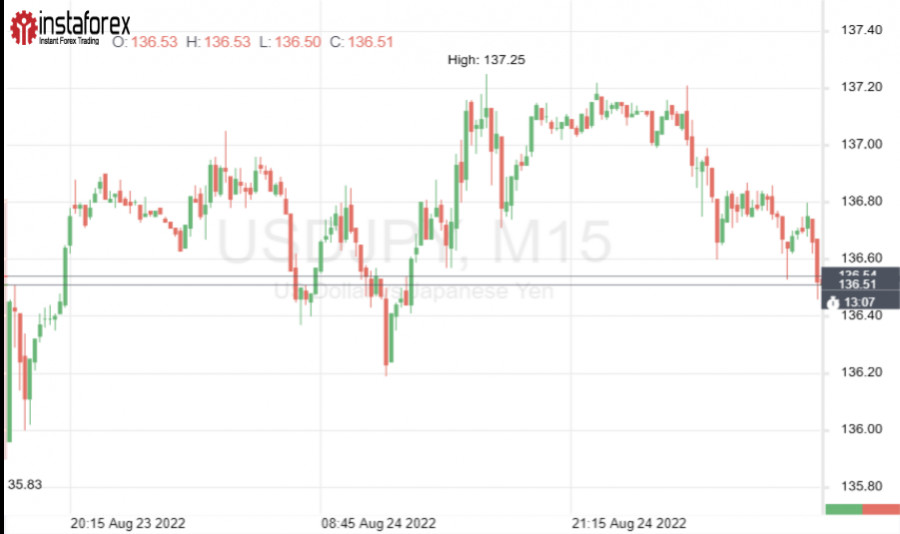So the day has come. Today the Federal Reserve symposium starts in Jackson Hole. The closer the event is, the more cautious the markets are. The USD/JPY pair is falling in the morning, but at the same time retains a huge growth potential.
On Thursday, the main economic get-together of August begins in the US state of Wyoming - the annual symposium of the Fed.
Markets expect that in Jackson Hole, the US central bank will finally reveal its plans for further monetary policy.
The culmination of the forum should be Friday's speech by the head of the Federal Reserve. Most analysts believe that Fed Chairman Jerome Powell will confirm the need to continue an aggressive course.
This opinion is supported by a lot of hawkish comments from Fed members, which were made ahead of the symposium in Jackson Hole. Officials are still determined to fight high inflation.
Of course, there is no denying the fact that recent signs of easing inflationary pressures have caused a sigh of relief from Fed policymakers. However, the path to achieving price stability is far from over, and the central bank is likely to continue to raise interest rates at the same rate.
Amid such rhetoric, concerns that the US central bank may be inclined to a slower pace of rate hikes have significantly decreased in recent days.
Currently, futures markets estimate the probability of a 75 bps rate hike next month at 60.5%.
If tomorrow the Fed chairman gives even the slightest hint that this is real, we will see another enchanting rally of the dollar.
However, while uncertainty remains about the Fed's future route, the greenback remains under pressure. This explains its current weakness.
The DXY index fell by 0.15% on Thursday morning and retreated from its almost 20-year high of 109.27 to 108.47.
And most of all, the "greenback plunged against the Japanese yen. The USD/JPY pair fell by 0.25% to the level of 136.775.

The Japanese currency benefits from a less sharp increase in Fed rates, since it has already suffered a lot this year from the aggressive course of the US central bank.
Recall that the monetary policy of the Bank of Japan remains ultra-soft, despite the global trend of tightening and increasing inflationary pressure in the country.
Unlike its colleagues, who are struggling with rising prices by raising interest rates, the BOJ stubbornly keeps the indicator at an ultra-low level. And apparently, the central bank will continue to bend its line.
The BOJ's main task is not to suppress inflation, but to restore the economy, which has suffered greatly after the coronavirus pandemic.
It is for this reason that the Japanese authorities continue to inject liquidity into the financial system by actively buying government bonds.
Despite the measures taken, Japan's economy still cannot fully recover from the recession caused by COVID-19. This was stated today by BOJ board member Toyoaki Nakamura.
The official warned that the prospects for the Japanese economy are clouded by another surge in the incidence of coronavirus, continuing supply constraints and a constant rise in commodity prices.
He stressed that the BOJ should not abandon large-scale incentives to support the economy and switch to the side of the hawks just because everyone is doing so now.
In his opinion, the tightening of monetary policy may become a serious deterrent for business, as a result of which economic growth will again be under threat.
Meanwhile, most analysts believe that the BOJ will stick to its dovish strategy for a long time.
A survey conducted by Bloomberg showed that 16 out of 19 experts exclude the possibility of a change in the monetary rate of the BOJ before the expiration of Haruhiko Kuroda's term of office in April 2023.
According to experts, the head of the Japanese central bank will stand his ground even if inflation in the country reaches the highest level of 3% in more than 30 years.
In order for Kuroda to agree to the normalization of monetary policy, inflation should remain above 3% for at least six months, Bloomberg writes. And this, if you believe the forecasts, will not happen.
According to Japanese economists, inflation will reach 2.5% at the end of this year, and by the end of 2022 it may drop to 1%.
All this indicates that the BOJ will remain a black sheep among its colleagues. This scenario is extremely unfavorable for the yen.
Due to monetary divergence, the Japanese currency has fallen in price against the dollar by almost 15% this year. Therefore, the position of the JPY is unlikely to improve much, even if tomorrow the head of the Fed does not meet the expectations of the markets and signals a slowdown in the pace of tightening.
The yen can only benefit from this in the short term. The dollar will still have the main trump cards in its hands – several more stages of raising rates.

SZYBKIE LINKI